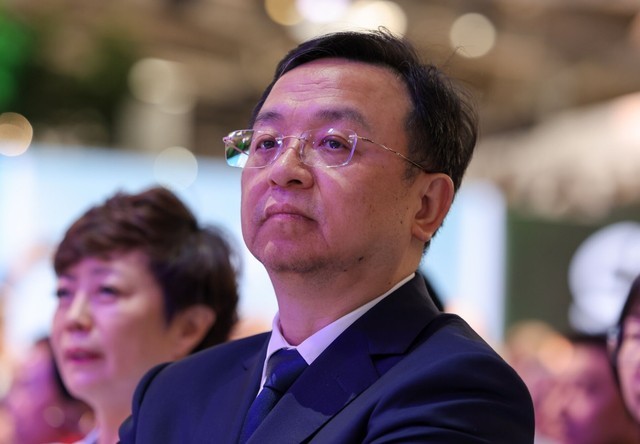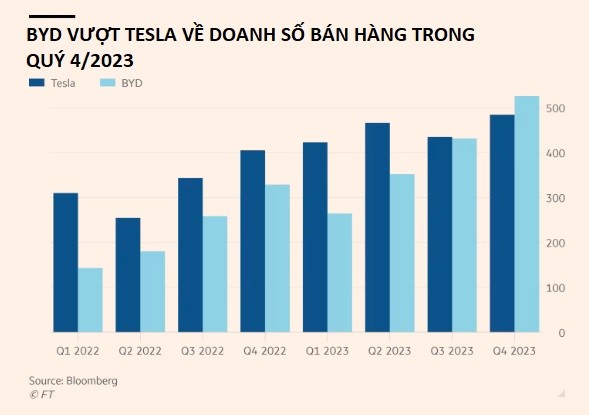The university professor, who was once mocked by Elon Musk 13 years ago, is now earning worldwide admiration.
At the end of 2011, billionaire Elon Musk couldn’t hide a smirk at the thought of Tesla possibly being overtaken by the Chinese automaker, BYD. ‘Have you seen their car? I don’t think it’s very appealing,’ he explained on television. ‘The technology isn’t strong. And the BYD company itself is facing problems in their home country.’
Even at that time, the Tesla tycoon believed the statement of launching a cheaper electric car by BYD was presumptuous since the manufacturing cost in California, USA, for Tesla was 10-20% lower than in China. At this point, Elon Musk’s empire primarily sourced components from the US and Mexico.
Over a decade later, the Shenzhen-based company, led by entrepreneur Wang Chuanfu, claimed the throne from Tesla to become the world’s largest electric vehicle manufacturer. Specifically, in the fourth quarter of 2023, BYD, founded in 1995 and including Warren Buffett’s Berkshire Hathaway among its shareholders, sold a record-breaking 526,000 fully electric cars compared to Tesla’s 484,000.
‘That was many years ago. Their products are extremely competitive now,’ Elon Musk had to admit his mistake of mocking the BYD electric car company 13 years ago.
‘Three to five years ago, no one thought that Chinese electric cars would have enough quality or reliability to compete,’ said Tu Le, founder of Sino Auto Insights, a consulting firm in Beijing. BYD’s success further adds allure to the story of rising from poverty by CEO Wang. The tale of a professor turning into a shrewd manager with a keen focus on technology, supply chain, and cost reduction has become a ‘sacred text’ in science and business schools in China.
For his employees, Wang is simply known as ‘Chairman.’ With both reverence and trepidation, employees regard him as a detail-oriented manager with a work ethic akin to the Stakhanovite industriousness, despite the modest appearance of this 57-year-old billionaire.

‘The concept of work-life balance simply does not exist in his vocabulary,’ said Michael Dunne, CEO of an automotive-focused consulting firm in Asia called Dunne Insights.
In 2008, Charlie Munger persuaded his business partner, Buffett, to invest $230 million for a 10% stake in BYD, which was then not well-known. Munger argued that in CEO Wang, there was a combination of Thomas Edison and Jack Welch—the former General Electric CEO. ‘I’ve never met anyone like him,’ Munger asserted. Since then, Berkshire has sold 2% of BYD’s shares and received $890 million. Their remaining stake is currently valued at around $2.3 billion.
BYD’s net profit doubled to 21.37 billion CNY, equivalent to $3 billion USD, in the first nine months of 2023 compared to the same period the previous year. The company’s stock price has increased more than fivefold since the beginning of 2020, pushing the company’s market capitalization to 622 billion CNY ($87.5 billion USD).
While Munger was impressed by Wang’s technical prowess, experts believe that BYD’s success is primarily due to an uncompromising cost-cutting culture. This entrepreneur has established ‘absolute cost control,’ according to Christoph Weber at the Swiss software group AutoForm.
Drawing deeply from lessons learned in producing mobile phone batteries and other components for Siemens, Nokia, and Motorola in the early days, BYD has developed its indigenous capabilities. Outsourcing to other companies for hardware or services is seen as a last resort. This was executed rigorously to the extent that a manager once said the company manufactures everything in the car ‘except the tires and windshield.’
The emphasis on costs laid the groundwork for the group’s vertical integration process, from raw material supply to batteries and computer chips. As one of the world’s leading battery manufacturers, the company supplies batteries to competitors including Tesla and Toyota.
This has led to manufacturing innovations. For instance, in BYD’s early days, Wang bought a stamping tool for the front face from Jeep in Beijing. This led to the company’s invention of ‘cell-to-body’ technology—integrating the car’s battery and body.
Apart from his leadership skills, CEO Wang is especially praised in China for advocating high-tech products that contribute to Beijing’s carbon emission reduction goals.

In his annual New Year speech last Sunday, Chinese President Xi Jinping mentioned that domestically-produced ‘new energy vehicles’ demonstrate the ‘manufacturing prowess of China.’
BYD’s battery technology has even become part of the curriculum at Tsinghua University in Beijing for many years. High school students now study Tang, a BYD plug-in hybrid SUV, as part of their physics lessons.
After conquering the Chinese market, Wang is now eyeing international markets. In November, BYD management told Citigroup analysts they aim for a long-term market share of about 10% in markets outside the US or Europe. This implies annual foreign sales—from countries other than the two key Western markets—of 2-3 million cars, up from around 240,000 this year, according to Citigroup.
As a trial, BYD is planning to build its first car factory in Europe in Hungary.
In 2018, BYD’s success attracted Akio Toyoda, who was then the Chairman and CEO of Toyota, to visit Shenzhen. Before the meeting, Wang told colleagues that he was concerned Toyoda would mention that BYD’s models resembled those of Toyota. But instead, Toyoda spent most of the meeting asking Wang about how he achieved such low-cost production.












